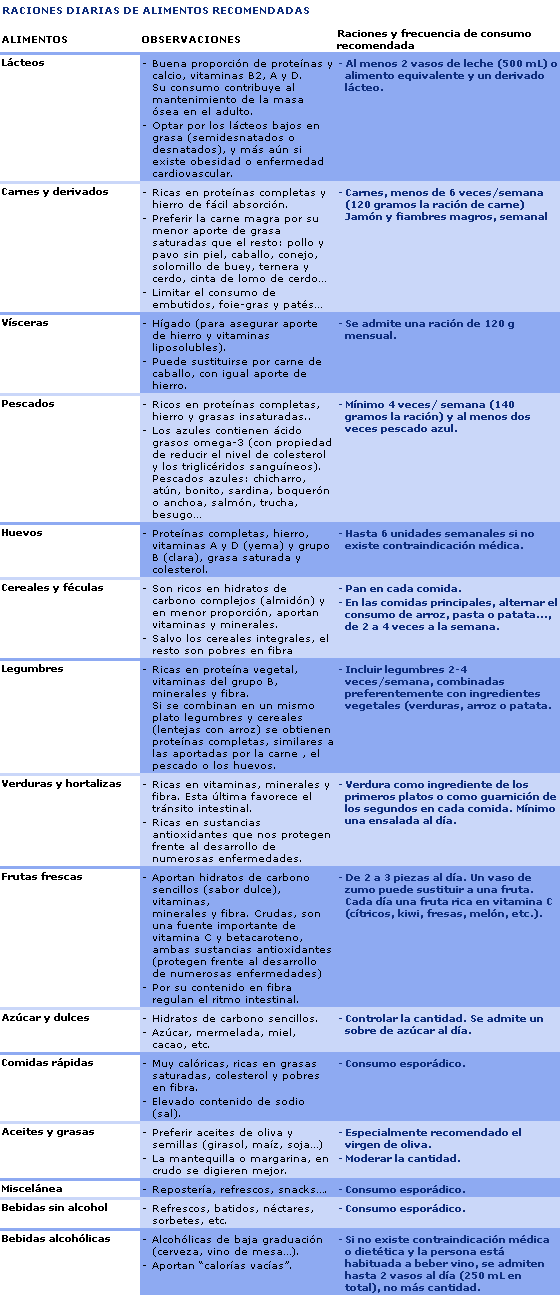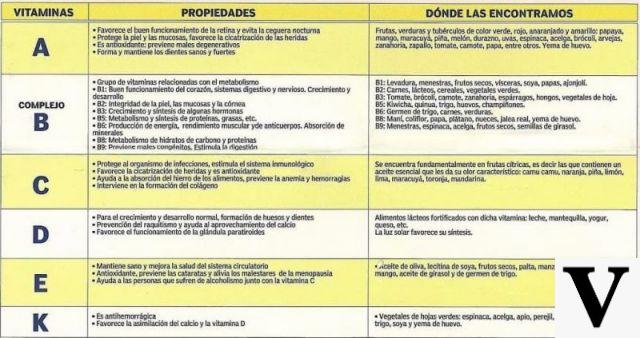
Introduction
To be carried out effectively and efficiently, any bodily activity has specific metabolic and energy needs and requires an adequate chemical-nutritional intake; as can be deduced, nervous and cognitive functions are absolutely no exception.
In this short but comprehensive article we will try to better understand what, how much and when to eat to support the study activity in an optimal way. Given the time of year, which sees thousands of students engaged in the "grand finale" of the middle-high school path, we will discuss more precisely the ideal diet of the maturant.
Premise
Ideal diet for the maturing: what it can and what it cannot do
Before going into the merits, as a brief introduction, it is good to clarify some fundamental concepts:
- The ideal diet for the aging " DON'T the desire to study increases "
- An excellent state of nutrition certainly represents "an extra gear" but food and drinks, as well as supplements, " DON'T they work miracles "
- Nutrition must be given the role it deserves and nothing more. Often weakness and exhaustion are real "alibis" (excuses), or symptoms attributable to other factors such as, for example, emotional overload and stress, alcohol or drug abuse (even light drugs), overtraining (overtraining, obviously for athletes ) etc.
Nutritional Needs
What does the student need to study?
It is perhaps the most frequently asked question when it comes to the diet of the accruing. In truth, the study activity is not the most expensive, but it certainly "costs more" to the body than to rest. Compared to resting, studying requires a calorie difference of about 70-75 kcal / hour. Therefore, a subject who "studies hard" for 6-8 hours a day, unlike a doing nothing, would need about 440-580 kcal more.
What we must not forget, however, is that under normal conditions the brain runs on glucose. The central nervous system (CNS, consisting of the brain and spinal cord) is in fact:
- Free from insulin action
- Unable to oxidize fatty acids
- Relatively able to use ketone bodies
- Totally glucose dependent.
What does it mean? Simple. First of all, nerve cells do not have GLUT receptors and therefore do not need insulin delivery to capture glucose from the blood. This is good, because even in conditions of impaired hormone production or poor receptor sensitivity (see insulin resistance and diabetes mellitus), assuming a normal glycemic level, the brain can function normally.
In the second instance, however, it must be remembered that glucose, in addition to being the main fuel, is essential for the brain and with a very modest margin of tolerance. Unlike muscles, for example, nerve tissue cannot derive energy from fat. Obviously then, it does not have the possibility to perform neoglucogenesis, which the liver complies with for the whole organism. So, if for various reasons the blood sugar were to undergo a significant change, the brain would pay the costs. Fortunately, the healthy body has an extremely sensitive modulation, which engages various hormones, and is able to constantly maintain normal blood glucose levels.
However, many do not know that, in addition to hypoglycemia (low blood sugar), hyperglycemia also has deleterious effects on the functioning of the CNS. In addition, they can significantly impair the effectiveness and efficiency of the brain:
- Acid ketosis, due toexcess of ketone bodies in the blood which, in healthy people, increase mainly due to inappropriate eating habits (see out of control ketogenic diet). In fact, up to a certain limit, these do not seem to compromise any nervous process and indeed constitute a secondary substrate but, once a certain threshold is exceeded, they tend to create many uncomfortable symptoms.
- Hydro-saline imbalance, due to the lack of water and minerals, in particular magnesium and potassium
- Hypovitaminosis, especially of the water-soluble vitamins of the B complex, water-soluble molecules which, having a mainly coenzymatic function, intervene in an innumerable series of cellular processes - it is therefore logical that a deficiency also negatively affects brain function.
Diet
Which diet for the maturing?
Without a doubt, the ideal diet for the aging is a balanced regimen, therefore:
- Normal calorie: which provides, that is, all the energy needed to keep weight and body functions stable. It takes into account age, sex (because it is related to muscle mass), constitution, morphological type and level of physical activity (including motor activity)
- Properly divided between meals, which must be at least five, preferably organized as follows: breakfast (15% of total calories), snack I (5%), lunch (40%), snack II (5%), dinner (35 %); some also prefer to include a snack III, after about two hours from the end of dinner, in this case it is advisable to remove 5% of the calories from lunch
- Well distributed among the energetic macronutrients, more or less as follows:
- Proteins, to the extent of about 1,5 g / kg of physiological weight (i.e. normal), better if 1/3 of which have a high biological value, i.e. from animal sources (eggs, meat, fish, milk and derivatives)
- Lipids, in 30% of total calories. The essential ones, omega 3 and omega 6, must have a total importance of about 2,5% (omega-3 0,5% and omega-6 2,0%). Saturates and hydrogenates should not exceed 1/3 of the totals. Those in trans conformation should be avoided as much as possible. It should be borne in mind that, with a reasonable use of seasoning oil, it is already possible to reach about half of the fat requirement.
- Carbohydrates, which represent all the remaining energy (on average 55%). Most of it is of the insoluble, complex type, that is, it consists of the starch contained in cereals, legumes, potatoes and derivatives. Those soluble, that is provided by all sweet foods, should not exceed 10-18% (depending on whether or not those of vegetables, fruit and milk are included)
- With sufficient supplies of essential molecules, including:
- Amino acids: the 8-9 essential amino acids are essential for the protein synthesis of enzymes, neurotransmitters, receptors, etc., necessary for the proper functioning of all cellular metabolisms
- Fatty acids: especially the biologically active ones, therefore eicosapentaenoic acid (EPA) and docosahexaenoic acid (DHA), are involved in nervous function. This does not mean that an advantage can be gained by increasing them, but it cannot be ruled out that a deficiency may instead be problematic. Especially sea fish, such as oily fish or fish that live in cold seas, are rich in EPA and DHA, but also krill and algae
- Vitamins: they are all very important, but as we have said, the water-soluble coenzyme factors of group B play a decisive role. They are contained in plant and animal foods, which is why the only way to guarantee their complete pool is to follow a varied diet.
- Minerals: also in this case, no one is to be excluded. Magnesium and potassium, together with water, ensure adequate homeostasis of body fluids. Then, various minerals are involved in nerve cell processes, as well as iron, calcium and zinc, but their presence is usually regulated by regulatory mechanisms that do not undergo changes in the short term. It means that any deficiency in the diet would have obvious repercussions only in the case of severe and protracted malnutrition. To take them all, the principle of a varied diet applies
- Having the right levels of other nutritional factors such as:
- Water: overall, in the absence of sweating, it should be taken in quantities of 1 ml / kcal taken with the diet (in a 2000 kcal diet, for example, about 2 liters of water per day are needed). Remember that water is also included in food, which is why the one to drink should correspond to the remaining fraction
- Fibers, to ensure adequate intestinal function. The gut, let's not forget, has a profound affinity for the same neurotransmitters in the nervous system. A stressful condition can therefore modify its peristalsis and create constipation or diarrhea. A good intake of soluble fiber (more present in fruits and vegetables) can improve both one and the other situation
- Non-vitamin or mineral antioxidants: for example plant polyphenols, which protect against oxidative stress and some of which favor capillary elasticity. They do not significantly affect the ability to study, but a total lack in the diet can only be a negative factor for nutritional balance
- Cholesterol: without going too much into the merits, since it is not relevant to the topic of the article, we suggest not to exceed 300 mg / day of dietary cholesterol.
What not to do before and during high school
The list of things to " DON'T do"is almost infinite. We will therefore limit ourselves to briefly summarize some concepts based on statistics:
- Taking excessive amounts of stimulating nerve agents, for example caffeine, theophylline and theobromine, respectively contained in coffee, cola-like drinks, tea (especially black), energy drinks, food supplements, etc. If in small doses they can facilitate a good level of attention, beyond the subjectively tolerable dose they compromise emotional stability by feeding anxious states.
- Taking any kind of dietary supplement recklessly. Marketing is ruthless and many products are offered on the market which, even if well advertised, are totally useless. Consultation with a good dietician is recommended to assess the relevance or otherwise of dietary supplementation
- Fasting or overeating
- Give in to abuse, such as smoking, alcohol and drug use
- Compromising sleep, even if to study. A brain that is not recharged and that has not stored the notions learned is far from receptive. The right hours of sleep are needed to optimize the study
- Stop social and sporting life. Being alienated is counterproductive; moreover, taking away from the brain the usual dose of endorphins released with sport can prove to be almost disastrous for the psychophysical balance of the subject.
Keep Calm and Carry On
The true importance of maturity
This small concluding paragraph has the function of easing the spirits and re-dimensioning the true importance of maturity. It often happens that, in view of the exams, students fall prey to anxiety and / or a reduction in mood. Diet has nothing to do with it, or has a marginal role.
Competitiveness and expectations often play tricks, putting too much pressure on high school graduates. This is wrong. Let us not forget that the most instinctive animal reaction to the perception of danger is flight, which in these cases is expressed as "inaction from studying".
Unfortunately, sometimes the parents themselves do not seem to improve the situation. In their defense, however, it must be admitted that, "usually", theirs is an irrational and unconscious attitude; reliving their own past experience in their children, they transmit the same emotions and feelings, making them load more stress and thus perpetuating an endless cycle. On the other hand, it is undeniable that some young people can only benefit from greater stimuli (provided that, behind the mask of laziness, there is no fear of failure).
All this happens mainly due to a wrong attitude towards this delicate period in which, like dovrebbe be clear, it does not decide the outcome of the previous 5 years. Whether it is good or bad, it is instead a simple "rite", a "simulation of life", with educational and preparatory purposes.
The outcome of the baccalaureate exam will have a decidedly modest impact on your future life, while the memory you will keep of it will play a decisive role.


























